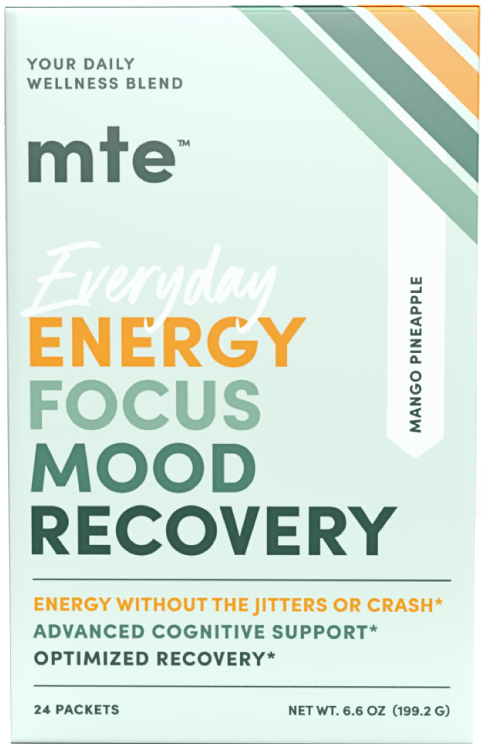
Why We Don’t Touch Sucralose or Any Other Fake Sugar
Ever notice how sugar-free usually means a weird ingredient soup? Brands love to slap that label on the can and call it a health win, but behind the curtain, it’s usually sucralose, aspartame, or some other lab-born sweetener pretending to be your friend.
The problem is that those fake sugars aren’t harmless. They can mess with your gut, confuse your brain, and leave you craving even more sweetness. That’s a ticket to the same old energy rollercoaster you’re riding every day.
At MTE, we don’t play chemistry class with your health. We keep the junk out and load up on real ingredients that sharpen focus, steady your energy, and keep your body running clean.
Sucralose Isn’t Sweet on Your Health
Sucralose (Splenda) won't ever earn a spot in our MTE formula. It might taste innocent, but it’s bioactively mischievous.
Gut Health Gone Rogue
Multiple human and mouse studies have shown that sucralose can mess with your microbiome by triggering gut dysbiosis, blood sugar imbalances, and altered insulin responses. Think of it like handing your gut the wrong set of instructions and suddenly everything feels off, from bloating to energy dips.
Immune Function Sabotage
In rodent models, high-dose sucralose interfered with T-cell efficiency, slowing immune response and reprogramming gut flora for the worse.
Cellular Red Flags and Brain Fog
One metabolite, sucralose-6-acetate, raised eyebrows by showing genotoxic behavior (translation: DNA alarm bells) in lab tissue testing. Meanwhile, early evidence links fake sweetness to hunger confusion, stirring cravings without delivering actual fuel.
Corporate Safety? The Verdict’s Murky
Sure, regulatory bodies call it “safe” in small doses. However, newer research signals persistent risks, especially with long-term or prenatal exposure. That includes everything from metabolic disruption to obesity and inflammation among offspring.
The Gut Check: Fake Sugars vs. Your Microbiome
Your gut is an ecosystem. Think of it as a rainforest teeming with trillions of tiny organisms working together to keep your body in balance. Real food helps the good guys thrive, but fake sugars act more like a chemical storm that wipes out the natural order.
Research shows that artificial sweeteners like sucralose and aspartame can alter your gut microbiome by reducing beneficial bacteria and encouraging the growth of harmful strains. That’s like replacing half your rainforest with weeds. It throws off the balance, disrupts digestion, and even affects how your body regulates blood sugar.
In addition, your gut and your brain are in constant conversation through the gut–brain axis. When your gut flora is off, signals to your brain get scrambled, which can leave you feeling sluggish, moody, or craving more of the very junk that caused the imbalance in the first place.
In short, fake sugars don’t just trick your taste buds – they trick your gut into chaos. When your gut is unhappy, the rest of your body isn’t far behind.
The Brain Fog Connection
Ever feel like your thoughts are moving through molasses after a sugar-free snack? That’s your brain running on low power mode.
Artificial sweeteners can disrupt how your body handles glucose, which is the brain’s main fuel. When your blood sugar regulation goes haywire, your brain doesn’t get the steady stream of energy it craves. The result? Sluggish thinking, poor focus, and that foggy “where did I put my keys?” feeling.
On top of that, remember the gut–brain axis? When fake sugars disturb your microbiome, they also disrupt neurotransmitter production – like serotonin and dopamine that regulate mood, motivation, and mental clarity. It’s like trying to run your computer on a corrupted file: the system still turns on, but nothing runs smoothly.
The irony is that many people reach for diet sodas or sugar-free drinks to stay sharp without the crash. Instead, they end up with the very thing they were trying to avoid – mental fatigue.
Why Zero Sugar Doesn’t Mean Zero Consequences
Slapping zero sugar on a label doesn’t make a drink magically guilt-free. It just means the sweet stuff got swapped out for chemical stand-ins that can confuse your body even more.
When you taste something sweet, your brain and gut expect calories and real fuel to follow. But when artificial sweeteners deliver nothing, your body feels tricked. That mismatch can leave you hungrier later, craving more carbs, and sending your blood sugar on a rollercoaster anyway.
Some sugar substitutes might even disrupt insulin response and metabolic balance. Your body doesn’t just shrug it off, but scrambles to adjust, which can ripple into weight gain, blood sugar spikes, and a higher risk of metabolic issues.
So, while the zero sugar stamp might look shiny on the can, the trade-off isn’t as clean as it seems. Fake sugars may save you a few calories in the short run, but over time, they can weigh heavily on your health in ways real sugar (at least in moderation) doesn’t.
Just to be clear, we’re not saying sugar is good. Far from it. Sugar has done massive damage to the American diet and is behind some of the biggest health issues we face today. That’s why we’re sugar-free ourselves. But the point is that if sugar is a problem, we need to be careful about the quick-fix alternatives as well.
What We Do Instead: Natural Sweeteners for Health Support
Instead of hiding behind artificial sweeteners with long, unpronounceable names, we take a clean and simple approach. Our formula uses stevia leaf extract and chicory root fiber to add a touch of natural sweetness without spiking blood sugar or bringing along questionable side effects.
- Stevia leaf extract – A clean, plant-based sweetener that delivers natural sweetness without calories or blood sugar spikes. It’s one of the few sweeteners the body recognizes without stress.
- Chicory root fiber (Inulin) – A natural prebiotic fiber that not only balances taste but also supports gut health, digestion, and healthy blood sugar response.
By leaning on natural sweeteners that support your body rather than stress it, we deliver a flavor profile that feels light, clean, and energizing without the baggage of artificial additives.
Choose the Sweet That Treats You Right
Sugar-free shouldn’t come at the cost of your health. Artificial sweeteners like sucralose and aspartame may cut calories, but they’re also linked to gut issues, brain fog, and other side effects that don’t support real energy.
MTE takes a different approach. We use natural options like stevia and chicory root for taste, so you get the flavor you want and the support your body needs.
If you’re ready for energy that fuels focus, clarity, and long-term health, it’s time to choose something better. Try MTE wellness drink powder and feel the new kind of energy.



